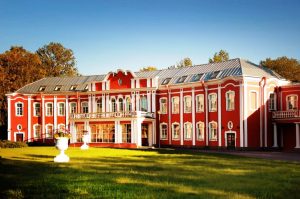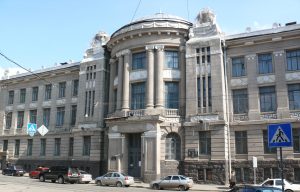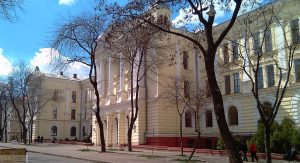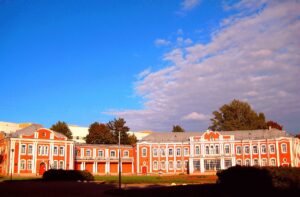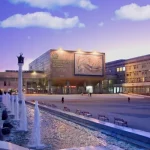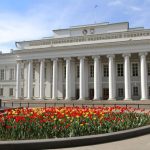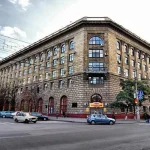
City: Saint Petersburg
North-Western State Medical University (NWSMU) in Saint-Petersburg (Russia) named after I.I. Mechnikov was founded in October 2011 as a result of a merger of two Russian institutions having unique history – Saint-Petersburg Medical Academy of Postgraduate Studies and Saint-Petersburg Medical Academy n.a. I.I. Mechnikov. The history of Saint-Petersburg Medical Academy of Postgraduate Studies began in 1896. The Academy was founded by famous Russian professors of medicine N. Pirogov,.E. Eichvald, N. Zdekauer. In its turn Saint-Petersburg Medical Academy takes its origins in Psychoneurological Institute founded by famous academician V.M. Bechterev in 1907.
- Over 7000 students
- University divisions: 77 buildings ,44,5 ha territory
- NWSMU named after I.I. Mechnikov ranks the 5th position among TOP 100 Russian Universities
- 3 main directions: medical education, clinical work and scientific research
- 112 departments and 8 faculties
- One of the largest centers of genetic engineering bio-therapy
- The largest Russian bank of umbilical cord blood samples
- Clinical work is provided by using 1645 beds in 14 medical profiles
- Annually the University provides high-quality medical assistance for about 40 000 patients at the hospital and to 40 000 in the outpatient setting
- 2 research institutions and 6 research laboratories and departments
- A big museum complex (Museum of forensic medicine with thanatology center, Museum of Anatomy, Museum of dentistry, SZGMU history museum)
NWSMU is named after outstanding Russian scientist in Medicine, Nobel Prize winner in Physiology and Medicine Ilya I Mechnikov.
Today the University carries out its activity in 3 main directions: medical education, clinical work and scientific research. At present about 7000 students, including foreign students are studying at the University. Up to 35 000 specialists undergo their short and long-term postgradual training annually.
The clinical work at North-Western State Medical University (NWSMU) named after I.I. Mechnikov is provided by using 1645 beds in 14 medical profiles in its own clinical centers. Every year the clinical departments of the University provide high-quality medical assistance for about 40 000 patients at the hospital and for 40 000 in the outpatient setting.
Research work at the University is carried out in accordance with the priority directions of biomedical sciences development and modern trends in higher medical education and is aimed to introduce the results of the scientific research into everyday practice. Scientific researches at the University are conducted by 2 research institutes, 6 research laboratories and departments.
The University is internationally active, students exchange and postgraduate exchange programs, professional practical training, foreign specialists admission are always available. Students from many countries of the world do their trainings at the University (they are form Finland, Germany, China, Japan, Portugal, Spain, Kazakhstan, France, Italy, Czech Republic, Great Britain, Poland, USA, Slovenia, Israel, Turkey, Belgium, Sweden, Serbia, Austria, Denmark, UAE, Netherlands, Norway and other country).
Students’ life at the University is rich and bright; it is focused on the development of social activity, leadership and communication properties due to the participation in the work of Student Council, Trade Union, Student Scientific Activities, Sports clubs and Press club.
Sport is an integral part of everyday students; life. Basketball, volleyball, futsal, arm-wrestling, chess, body-building and aerobic classes function at the University.
Every year NWSMU organizes concerts, competitions and other events for students.
NWSMU named after I.I. Mechnikov ranks the 5th position among “TOP 100 Russian Universities”.
According to the RAEX (international rating agency) NWSMU takes leading positions of Higher Institutions in the Commonwealth of Independent States.
The successful development of the educational, scientific, medical management of the University’s activity in many respects is connected with the formation and use of advanced information technologies which ensure free and fast access to the necessary information for making promising and valid solutions.
Educational activity.
The University prepares high-quality specialists at 112 departments, which are consolidated in 8 faculties:
Faculty of General Medicine
Medical-Prophylactic Faculty
Surgical Faculty
Therapeutic Faculty
Pediatric Faculty
Medical-Biological Faculty
Faculty of Education for Nurses, Health Care and Social Work
Dentistry Faculty
Training process is focused on a merger of traditional and innovative educational approaches and technologies. The quality of education is constantly being monitored by an independent Test Center.
Education is realized in Russian language, but for foreign students, who do not know Russian language the foundation course is available. The duration of the Foundation course is 1 academic year.
City at a Glance
- St. Petersburg is the second largest city of Russia.
- The city is situated on the shore of the Gulf of Finland, in the north-west of Russia, at the mouth of the Neva River.
- St. Petersburg has played a significant role in Russian history ever since it was founded.
- The city experiences rainfall throughout the year.
- The average temperature in Saint Petersburg city is 22.4 °C in summer & – 20.5 °C in winter .


